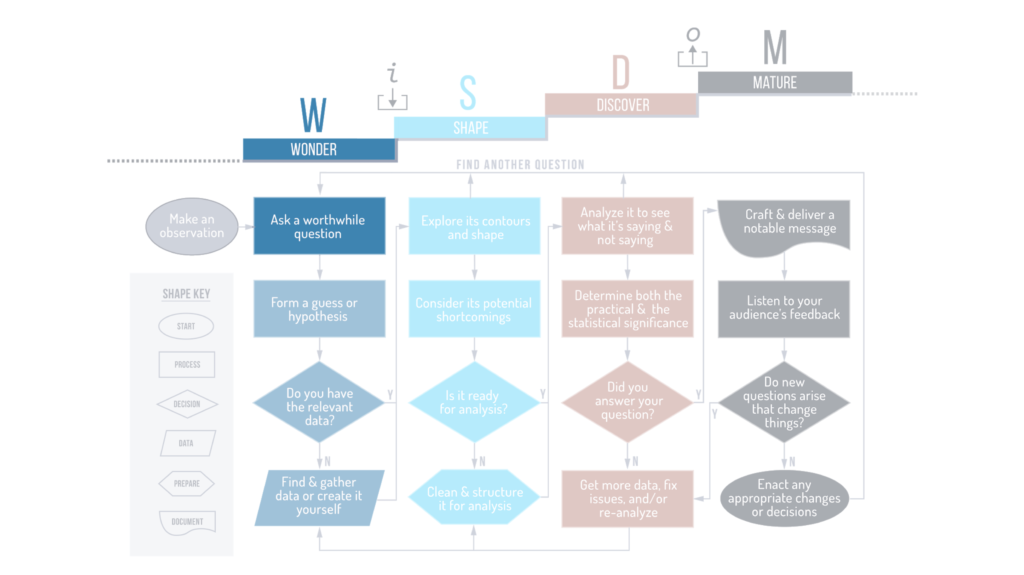1.2 Asking Worthwhile Questions
Topic Summary
The next step in the process of converting data into wisdom is to ask worthwhile questions. In some ways our questions are even more important than the answers we get. They define the scope of our thinking, and they set the stage for our learning opportunities. In this second step of the WISDOM Data-Working Flow, you’ll explore various forms your questions can take, and you’ll consider what questions apply particularly well to data.
Learning how to ask great questions is as important a skill as any other you’ll need to develop if you want to become fluent in the language of data. You will also take time to consider the “So What?” – the reason why your question matters in the first place. Lastly, you’ll learn the importance of asking questions about what’s not in your data for one reason or another. Sometimes the missing records can tell you as much as the ones that are there.
Where are You in the Flowchart?

Key Points To Remember
- Every journalist learns the “5 W’s (and one H)” of basic information gathering and problem solving: Who, What, When, Where, Why and How
- We have developed a new model called “A Dozen ‘Hows’ to Ask Your Data.” These 12 question types can be used by themselves or in combination with each other:
- Cardinality: How Many? – questions about basic counts of items
- Measurement: How Much? – questions about measurements or multiple readings
- Tendency: How Typical? – questions about averages or medians of quantities in our data
- Distribution: How Varied? – questions about how spread out a quantity in the data might be
- Part-to-Whole: How Comprised? – questions about the way a total amount breaks down into groups
- Time-Based: How Variable? – questions about how the data has been changing over time
- Comparative: How Similar? – questions about how two or more things or groups compare to each other
- Correlation: How Related? – questions about how two quantities might be correlated with each other
- Proximity: How Close? – questions about the relative location of elements and groups of elements in our data
- Network: How Connected? – questions about the linkages between individual “nodes” in our data
- Probability: How Likely? – questions about what might happen in the future based on conditions that might arise
- Causal: How Responsible? – questions about the cause-and-effect relationships between variables in our data
- Before moving forward to the next step in the process, take a moment to articulate your answer to the important question, “So What?”
- Remember to also ask questions about what didn’t happen, or what records aren’t in the data.
Definitions
- Septum Circumstantiae – elements of circumstance: quis, quid, quando, ubi, cur, quem ad modum, quibus adminiculis (Latin for who, what, when, where, why, in what way, by what means).
Course Project
Pose a worthwhile question about your chosen topic of interest:
- Using the “5 W’s and 1 H”
- Using “A Dozen ‘Hows’ to Ask Your Data”
Next, articulate why this question matters to you:
- So What?
Finally, think about whether there might be some things about the situation that you won’t see in the data. For example, if you’re looking at confirmed cases of a disease, you won’t see cases that weren’t detected or reported.
- What might be missing about the situation?
Quotes
“To ask the right question is harder than to answer it.“
Georg Cantor, German mathematician
“If you do not know how to ask the right question, you discover nothing.“
W. Edwards Deming
“I keep six honest serving-men
(They taught me all I knew);
Their names are What and Why and When
And How and Where and Who.“
Rudyard Kipling, The Elephant’s Child, Just So Stories (1902)
“I am just a child who has never grown up. I still keep asking these ‘how’ and ‘why’ questions. Occasionally, I find an answer.“
Stephen Hawking
Gregory: “Is there any point to which you would wish to draw my attention?“
Holmes: “To the curious incident of the dog in the night-time.“
Gregory: “The dog did nothing in the night-time.“
Holmes: “That was the curious incident,’ remarked Sherlock Holmes.“
Arthur Conan Doyle. The Memoirs of Sherlock Holmes. Oxford University Press, 1993, p. 274
“We live in the world our questions create.”
David Cooperrider
Further Learning
- Article – “A Simple Strategy for Asking Your Data the Right Questions” by Brent Dykes, Forbes (11 Aug 2020)